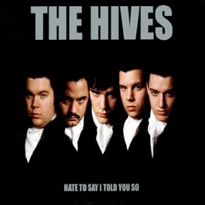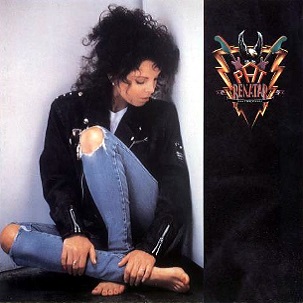
"Hate to Say I Told You So" is the first single from Swedish rock band the Hives' second studio album, Veni Vidi Vicious. It was first released as a single on 4 December 2000 and was later re-released in several countries in 2002. It is internationally known as the Hives' signature song.

"I Want That Man" is a song by American singer Deborah Harry. The song was released as the lead single from her third solo album, Def, Dumb & Blonde, and was the first record Harry released in which she reverted to using Deborah as her name instead of Debbie. "I Want That Man" became a hit in several territories, reaching number two in Australia and on the US Billboard Modern Rock Tracks chart. It also became a top-20 hit in Ireland, New Zealand, and the United Kingdom.

"Policy of Truth" is a song by English electronic music band Depeche Mode, released on 7 May 1990 as the third single from their seventh studio album, Violator (1990). It is the only Depeche Mode single to chart higher on the US Billboard Hot 100 chart than on the UK Singles Chart, and it became the band's second chart-topper on the Billboard Modern Rock Tracks chart.

"Electric Blue" is a song by Australian rock band Icehouse. It was co-written by Iva Davies of Icehouse and John Oates of US band Hall & Oates. Oates became involved with Davies after contacting him to state he was a fan. The resulting collaboration produced this song and Oates has stated that if Davies had not released the song under the Icehouse name, then it would have been a Hall & Oates track.

"Nobody" is a song by American singer-songwriter Keith Sweat featuring Athena Cage from the band Kut Klose. The song spent three weeks at No. 1 on the US Billboard Hot R&B Singles chart and reached No. 3 on the Billboard Hot 100. Internationally, it reached No. 9 in New Zealand, No. 10 in the Netherlands, No. 16 in Canada, and No. 22 in Australia. The music video for the single features a young Mekhi Phifer.

"You Came" is a song by English singer Kim Wilde from her sixth studio album, Close (1988). It was released on 4 July 1988 as the album's second single. The song was written by Wilde and Ricky Wilde, after the birth of his first child, Marty.

"I'm a Man Not a Boy" is the second single by British singer and actor Chesney Hawkes. Written by Hawkes, Nigel Hinton and John Wesley Harding, and produced by Alan Shacklock, it was included in the film Buddy's Song, with Hawkes as Buddy and Roger Daltrey as his father. The single entered the UK Singles Chart at No. 37 and climbed to a peak position of No. 27 a week later, making it the second of two of Hawkes' singles to enter the top 40.

"Couple Days Off" is a song performed by Huey Lewis and the News and released as a single from the album Hard at Play in 1991. The single peaked at No. 11 on the US Billboard Hot 100 and No. 4 on the Canadian RPM Top Singles chart, and it reached the top 40 on the charts of Australia, Germany, the Netherlands, and New Zealand. "Couple Days Off" was the band's final top-20 single on the Hot 100.

"French Kissin" is a song by American singer Debbie Harry from her second solo studio album, Rockbird (1986). It is a cover version of the 1985 song originally recorded by Carol Chapman, written by Chuck Lorre before he started creating sitcoms. Harry's version was released on November 3, 1986, as the lead single from Rockbird and became a top-10 hit in Australia, Ireland, New Zealand, South Africa, and the United Kingdom.

"Heartbeat Like a Drum" is a song by English new wave band A Flock of Seagulls, released by Jive in 1986 as the second and final single from their fourth studio album Dream Come True. The song was written by Mike Score, Ali Score and Frank Maudsley, and produced by Mike Score and Wayne Brathwaite.

"Don't Walk Away" is a song by American singer Pat Benatar, which was released in 1988 as the second single from her seventh studio album Wide Awake in Dreamland. The song was written by Nick Gilder and Duane Hitchings, and produced by Peter Coleman and Neil Giraldo.

"Glow" is a song by the English new wave band Spandau Ballet, released on 27 March 1981 as part of their third single, which, in the UK, was a double A-side with the song "Muscle Bound". The combined single was their third consecutive top 20 hit in their native UK, reaching number 10 on the UK Singles Chart. Elsewhere, "Muscle Bound" was the A-side. "Glow" was written while their debut album, Journeys to Glory, was in the finishing stages and not included on it, but a few different versions of the song were on the 2010 reissue of the album.

"Shame" is a song by American new wave band The Motels, which was released in 1985 as the lead single from their fifth studio album Shock. The song was written by Martha Davis and produced by Richie Zito. "Shame" peaked at number 21 on the US Billboard Hot 100.

"Remember the Nights" is a song by American new wave band The Motels, which was released in 1983 as the second single from their fourth studio album Little Robbers. The song was written by Martha Davis and Scott Thurston, and produced by Val Garay. "Remember the Nights" peaked at number 36 on the US Billboard Hot 100.

"Shock" is a song by American new wave band The Motels, which was released in 1985 as the second single from their fifth studio album Shock. The song was written by Martha Davis and Scott Thurston, and produced by Richie Zito. "Shock" peaked at number 84 on the US Billboard Hot 100.

"Don't Tell Me the Time" is a song by American singer-songwriter Martha Davis, which was released in 1987 as the lead single from her debut solo studio album Policy. The song was written by Davis and produced by Richie Zito. "Don't Tell Me the Time" peaked at number 80 on the US Billboard Hot 100 and number 8 on the Australian Kent Music Report chart.

"Tell It to the Moon" is a song by American singer-songwriter Martha Davis, which was released in 1988 as the second single from her debut solo studio album Policy. The song was written by Diane Warren and produced by Richie Zito. "Tell It to the Moon" failed to chart in the US, but peaked at number 65 on the Australian Music Report chart.

"Shadows of Love" is a song by new wave duo Wax, released by RCA in 1986 as the third single from their debut studio album Magnetic Heaven. The song was written by band members Andrew Gold and Graham Gouldman, and produced by Phil Thornalley.

"Two Hearts" is a song by English singer and musician John Parr, released in 1986 as a single from the soundtrack of the 1986 American sports drama film American Anthem. The song, written and produced by Parr, was also included on Parr's second studio album Running the Endless Mile (1986).

"Downtown" is a song by English singer, songwriter and musician Lloyd Cole, released in 1990 as the third and final single from his self-titled studio album. The song was written by Cole and Blair Cowan, and produced by Cole, Fred Maher and Paul Hardiman. It failed to enter the UK Singles Chart but reached number 5 on the US Billboard Modern Rock Tracks chart. The song was included in the soundtrack of the 1990 American psychological thriller film Bad Influence.




















